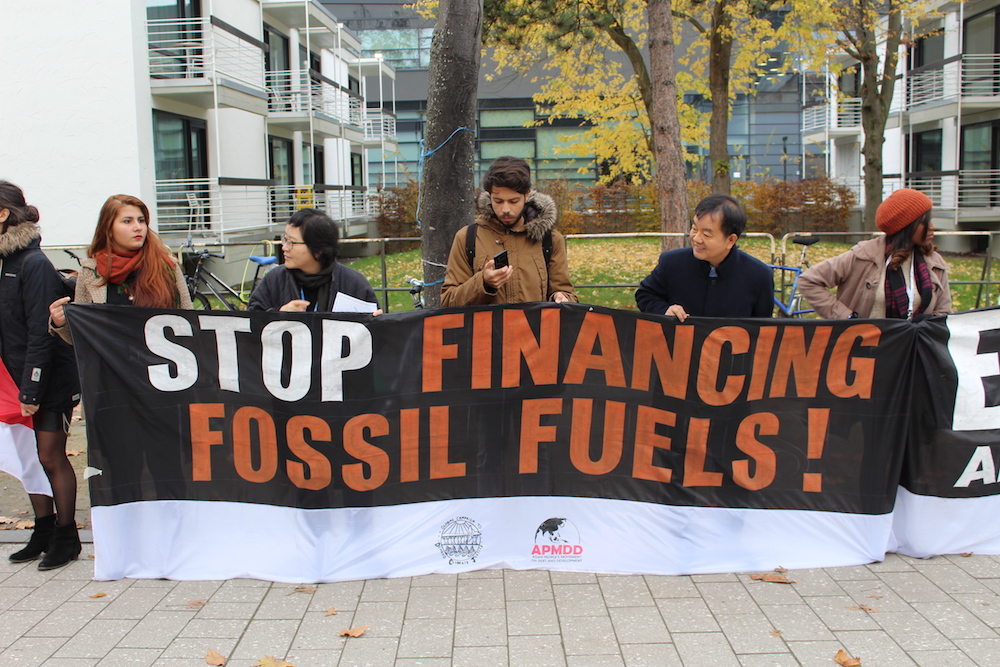By Natalie Sauer, Climate Home News. This article originally appeared on Climate Home News.
The World Bank Group faces criticism for continuing to back fossil fuel development, despite moves to clean up its portfolio.
It has earned green credentials for ending direct lending to coal-fired power plants, promising to axe support for oil and gas exploration and increasing its clean energy budget.
Yet over the last five years, the group’s support to oil and gas actually increased, while coal benefitted from indirect subsidies, according to analysis from German NGO Urgewald.
The study, which covers 675 active investments, found $21 billion went to fossil fuels between 2014 and 2018. While clean energy finance grew rapidly, it did not catch up. The figure was $7 billion or $15 billion, depending on the inclusion of large-scale hydropower and other projects with disputed environmental benefits.
“It is a big disappointment to find that the World Bank Group continues to provide such vast amounts of public finance for fossil fuels,” said report author Heike Mainhardt. “The bank thereby completely undermines its own efforts for renewable energy sources as well as the Paris climate goals.”
A spokesperson for the World Bank defended its record, saying the Urgewald report “paints a distorted picture of our energy sector work.” The inclusion of “legacy projects where financing was approved many years ago” means it “does not reflect the substantial changes that have happened in World Bank energy financing over the past decade,” he said.
In the last fiscal year, the bank approved $20.5 billion in finance for climate action, he added, meeting a 2020 target two years ahead of schedule.
The report comes days after the World Bank confirmed its new president, David Malpass, Donald Trump’s choice for the job.
Environmentalists have voiced fears the former U.S. treasury official might deprioritise climate change, in line with Trump’s politics. But Malpass offered early assurances he saw climate change as a “key problem” would not seek to reverse the ban on coal finance.
“Looking at his background, we are very curious how seriously he will lead the bank’s climate efforts,” Moritz Schröder-Therre, a spokesperson for Urgewald, told Climate Home News. “The bank’s member states outside the USA, especially the powerful European shareholders, which are currently reconstructing their own energy systems at home to decrease their climate impact, should make sure that Malpass stops the bank’s fossil business and increases its assistance for developing countries [to form] climate-resilient energy systems that benefit the poorest rather than the business and political elites.”
The Urgewald report found World Bank gas finance increased from $1.5 billion in 2014 to $2.2 billion. Oil projects also saw a slight increase. Renewables funding, including large hydropower, boomed from $0.5 to $2.0 billion.
It also identified backdoor support for coal. In March 2016, the Multilateral Investment Guarantee Agency (MIGA), a bank subsidiary, lent $783 million to the German Deutsche Bank and the Japanese Mizuho Bank. The funds were earmarked for the South African energy group Eskom to support a “capacity expansion program.” Among other purposes, they will finance transmission lines to transport electricity from Eskom’s new coal-fired power plants.
The bank encouraged coal, oil, and gas investments in Ghana, Kenya, Mauritania, Cote d’Ivoire, Mozambique, Senegal, Egypt, Tanzania, Nigeria, and Burkina Faso, according to the study. Fossil fuel projects in those countries benefited from tax breaks, consultations, or assistance to draft legislation.
Among the controversial projects highlighted by the study is the Trans Anatolian Pipeline (Tanap), a 1,800-kilometer gas pipeline through Azerbaijan and Turkey. The bank has provided $800 million in loans and a $1.1 billion guarantee to the project, which has been heavily criticized over climate, corruption, and human rights concerns.
The development institute also granted $935 million of loans and credits to an offshore gas field in Ghana, paving the way for associated oil fields.
The World Bank and the International Monetary Fund are holding spring meetings from April 12 to 14 in Washington.
Published under a CC BY–ND 4.0 license.
Main image: Activists protest fossil fuel project financing outside the 2017 UN climate talks in Bonn, Germany. Credit: Ashley Braun, DeSmog
Subscribe to our newsletter
Stay up to date with DeSmog news and alerts






